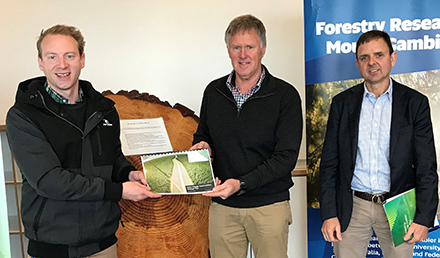
Minister for Environment and Water David Speirs receiving the GTFIH strategic plan from acting chair Ian McDonnell alongside Member for MacKillop Nick McBride
South Australian Minister for Environment and Water David Speirs met with Green Triangle forest leaders this week to hear first-hand the industry plans for growth and need for certainty over water security. Source: Timberbiz
Members of the Green Triangle Forest Industries Hub presented the board’s strategic plan to the Mr McBride at a round table session, highlighting the importance of having a fair and equitable Water Allocation Plan for the Lower Limestone Coast region to enable the establishment of new plantations and replanting of harvested estates.
The Minister was also briefed on the innovative work of NIFPI (National Institute for Forest Products Innovation), delivered by Forest Research Mount Gambier, which is researching forestry tree water use to deliver updated science into the 2023 Water Allocation Plan review.
GTFIH acting chair Ian McDonnell said the industry was engaging with all water stakeholders to build a broader community plan for sustainable use of the infinite resource.
“Our plan is clear that we want to grow and future-proof the Green Triangle forest and manufacturing sector. The foundation toward achieving this is to have access to water,” Mr McDonnell said.
“Our sector is proactively working with government and other key water stakeholders in the agriculture sector, and in indeed in conservation, to understand how we can all collaboratively benefit from gaining greater access to water.
“By undertaking further research into the science of forest water use we can provide a robust evidence base for government consideration as the Water Allocation Plan is reviewed. Meanwhile, we are very interested in exploring opportunities to also save water.
“There is more than 110GL of water that flows to sea in the man-made drainage network. This is water going to waste that could be diverted back for broader use, whether that is forestry, vignerons, dairy or supporting groundwater dependent ecosystems – we can all equitably share in this tapped resource.”
Mr McDonnell said as a result of the current Water Allocation Plan, it was estimated 20,000 hectares of land would not be replanted due to licensing limitations. This is the equivalent of the total plantation lost in the Ash Wednesday bushfires in 1983.
He said the industry was confident that a fair and equitable water plan could be achieved to support future investment.
“We are extremely grateful that the Minister is listening and working with our sector to support our ambitious plans to future-proof the industry. We look forward to sharing the extensive research work in the near future,” he said.
“Collectively, we want to ensure that forestry continues to play a key pillar in the state’s economy.”





